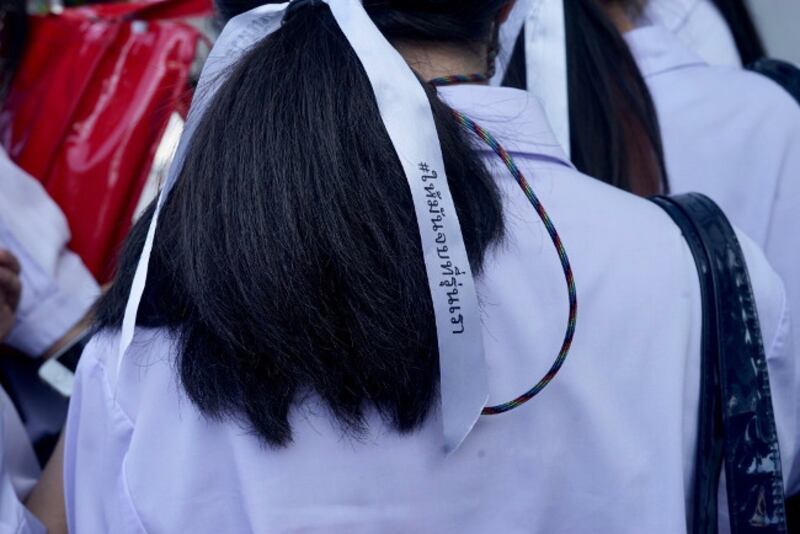The youth-led pro-democracy protests in Thailand since July have inspired hundreds of even younger Thais – high school students – to voice their concerns about the education system, which they describe as oppressive, unimaginative, and hidebound.
These high schoolers, ranging from 13 to 17 years old, ironically call themselves “Bad Students,” because they say they aren’t meek and submissive like many believe that ideal students should be.
Close to 500 of them, wearing symbolic white ribbons and mimicking the three-finger salute from the “The Hunger Games” movie, absented themselves from school and took to the streets on Aug. 2 and Sep. 5 to convey a message: “our first dictatorship is (in) school.”
The phrase has since gone viral on social media and is now closely associated with them.
For students, the white ribbon is usually a reminder of strict rules, because school girls with long hair are required to use it to tie their hair into a pony tail. But the Bad Students have inverted what the white ribbon means. For them, it now symbolizes freedom.
In their rallies they have demanded that the education system be radically altered and have called for Education Minister Nataphol Teepsuwan to resign if their demands are not met.
“Bad Students have three demands: stop harassing students, revoke outdated rules and reform the education system,” Benjamapon Niwas, a 10th grader from a Bangkok school, who considers herself a Bad Student, told BenarNews.
The student group members said they support the pro-democracy protests, long to express themselves freely and without the fear of corporal punishment, would relish a curriculum that didn’t turn them into robots – and also want to be allowed to wear their hair long, without the public humiliation of having teachers forcibly hack off their hair.
Because these youngsters belong to the social media generation, the Bad Students have highlighted their demands and grievances through catchy words and phrases that have captured the public’s imagination. Their hashtags, #stopharrassingstudents and #letitendinourgeneration, are wildly popular and have helped them broaden their support base.
For Patpoom, a senior from Khon Kaen Wittayayon School in northeastern Khon Kaen province, being young doesn’t mean capitulating to teachers and school administrators and relinquishing basic rights.
“Adults should know that youths like us can also ask for democracy. It’s not about age, it’s everyone's duty,” Khon told BenarNews.
Demanding that the schooling system be changed for the better is a democratic right, the Bad Students say.
Benjamapon, the Bangkok 10th grader, said the national curriculum was outdated and the mode of instruction didn’t encourage creativity, questions or independent thought. Instead, it has an assembly line-like quality, with a focus on hours spent slogging in school rather than the quality of that time.
“Good education is when students don’t feel like quitting, aren’t bored and don’t want to go home. If students don’t feel that way, it means that the education is horrible,” Benjamapon said.
“We have 10 classes a day and finish school at 5 or 6 p.m. It is taking up too much time in our lives. Our quality of life is poor. The problematic curriculum doesn’t account for students’ needs. In history, we learn the same things every year. We are mainly taught to memorize, not to utilize.”

‘Road of Pain’
On Sept. 5, Bad Students gathered for a debate between its representative and Education Minister Nataphol, who promised to implement some of the changes they demanded.
“I’m listening to everyone who wants to improve the education system. It is my duty,” Nataphol said on stage during the debate.
“There are a few things which I think are reasonable and I will implement. We are trying to fix the problems, however some regulations and laws are obstructing it. On the day I cannot be of use to the country or education system, I will resign.”
However, a little under a month later, the students were still waiting for a formal response to their demands from the education ministry.
Therefore, on Oct. 2, around 30 representatives of the Bad Students took their campaign to five well-known high schools in Bangkok and ended the rally with a sit-in in front of the Ministry of Education.
They dubbed that rally “the road of pain” because their efforts hadn’t borne fruit.
The participation of students in these rallies has not been without ramifications for some of them.
According to Khon Kaen senior Patpoom, at least two students from his school and their families had received threatening phone calls after the students expressed support for the August protest. Some teachers, too, targeted them, he told BenarNews.
‘Government needs to listen’
Academics and a school teacher who BenarNews spoke to said that the Bad Students were raising valid concerns.
What the Bad Students want is for authorities involved in education to listen, and they should, said Dr. Omsin Jatupon, a professor on the Faculty of Education at Chiang Mai University.
“They could follow the first demand immediately which is to stop harassment of students,” Omsin said.
“This should be common sense among teachers because students’ rights are obviously protected in the constitution and under the Children and Young Persons Act.”
Meanwhile, reforms to the curriculum as demanded by the students are also long overdue, Dr. Yupatep Boonyaritraksa, director of the Manee Anusorn School in Khon Kaen told BenarNews.
“Schools and the ministry should reflect on students’ demands and respond to their needs. Every school tries to produce children like canned fish, making them the same. The curriculum should have been adjusted a long time ago,” Yupatep said.
Dr. Wirathep Pathumcharoenwattana, associate professor at the Research Center for Children and Youth Development, agreed that Thailand’s education system was outdated.
“The education system does not reflect the needs of new generations. Diversity in education should be stressed,” Wirathep told BenarNews.
